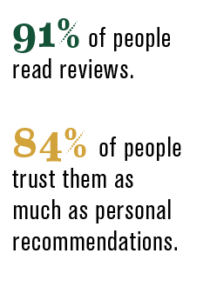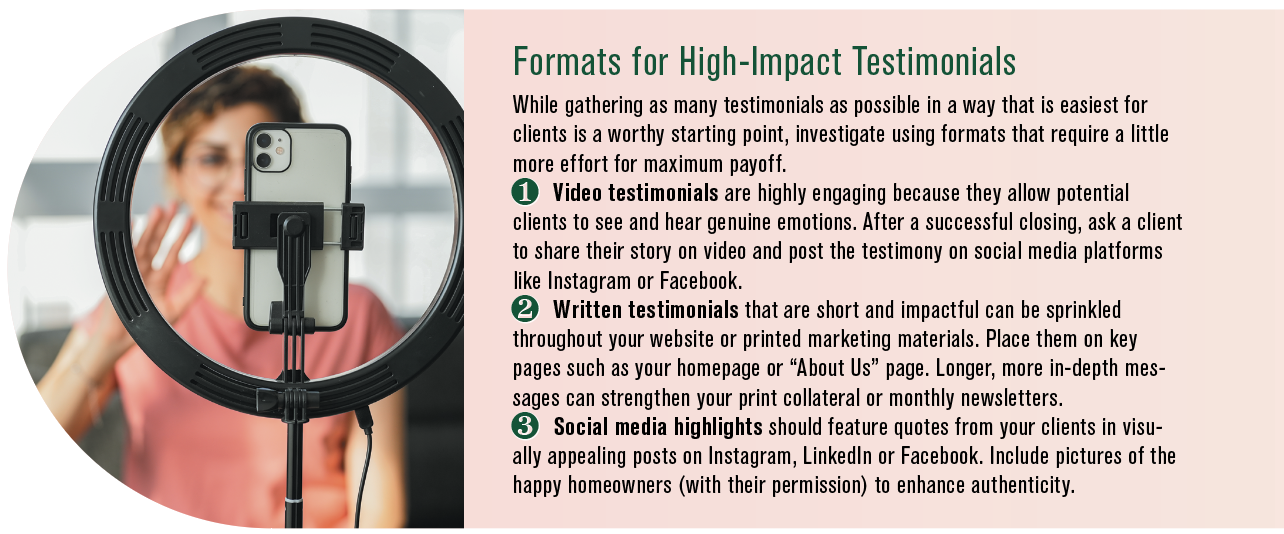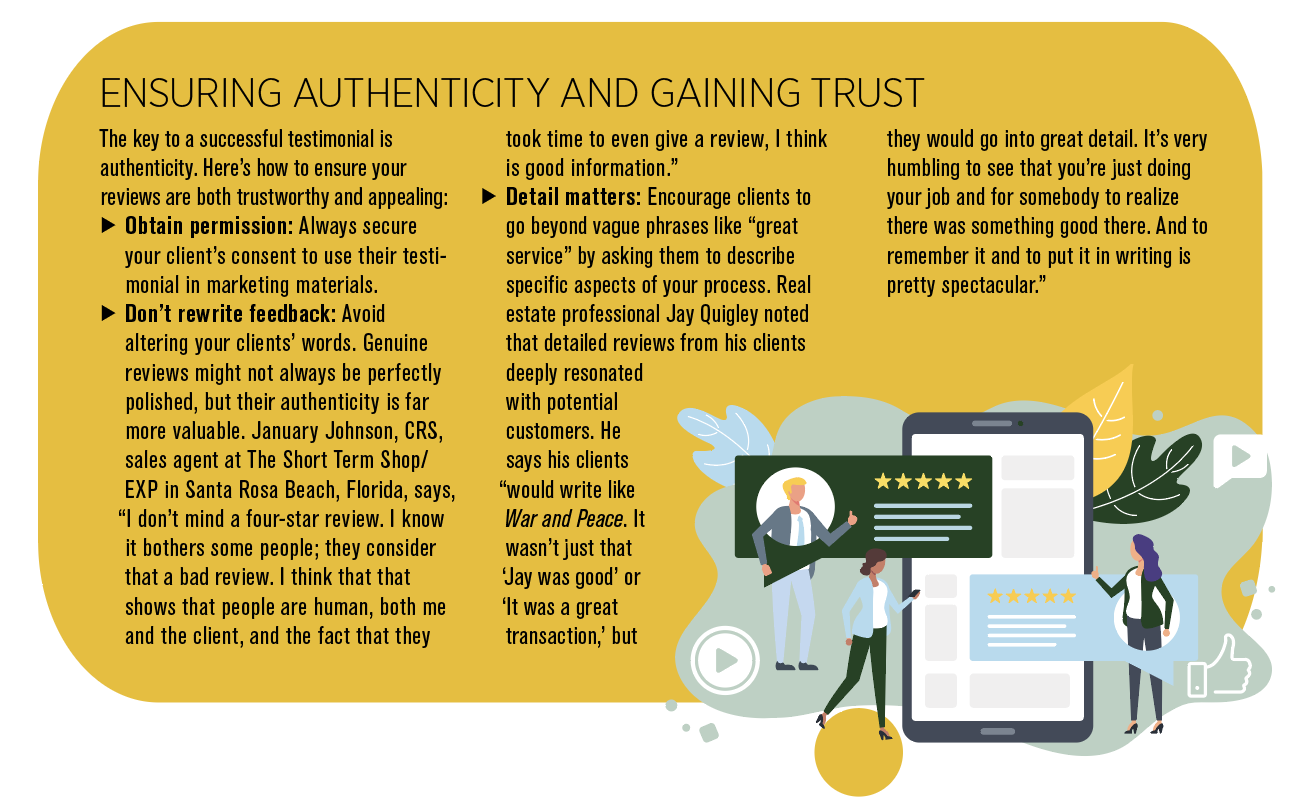By Myrna Traylor
These days, it’s hard to find anyone who doesn’t check a review when one is available—whether it’s for a book, kitchen gadget or vacation rental.
When it comes to promoting your real estate business, expanded reviews, or testimonials, can be an incredibly powerful tool to build trust and set you apart from the competition.
The reason testimonials are so effective can be traced to the psychological construct called “social proof,” or people’s tendency to seek confirmation for activities or decisions. Studies show that 91% of people read reviews and 84% trust them as much as personal recommendations. This means the testimonials you receive from your clients can be just as impactful as a word-of-mouth referral if done well.
Thoughtful testimonials are most effective because they:
- Build trust. A well-written or heartfelt testimonial from a past client makes your services feel credible and trustworthy.
- Highlight your expertise. Detailed feedback often emphasizes specific skills such as negotiation prowess or market expertise.
- Address client concerns. Hearing from clients who had concerns or obstacles but overcame them with your guidance can resonate with potential buyers or sellers.
- Humanize your business. Marketing is all about relationships. Testimonials add a personal and human element, showcasing the real-life impact of your work.
When and how to request testimonials
 Timing plays a critical role in capturing authentic testimonials. The closing process is the prime moment to ask the client to do you the favor of writing about their experience working with you. At this stage, the client is likely still experiencing the excitement of their new home or the satisfaction of a successful sale. Maria Dargan, CRS, broker associate at RE/MAX Revolution in Brick, New Jersey, emphasizes using tools like Rate My Agent right at closing to capture authentic reviews. “I talk to the client about writing a testimonial right around closing,” to prime the pump, says Dargan. “I email them a link to the service—but I realize they’re involved in getting their house set up—so, maybe it takes a few weeks before I get that testimonial, but that’s okay. I know it’s coming.”
Timing plays a critical role in capturing authentic testimonials. The closing process is the prime moment to ask the client to do you the favor of writing about their experience working with you. At this stage, the client is likely still experiencing the excitement of their new home or the satisfaction of a successful sale. Maria Dargan, CRS, broker associate at RE/MAX Revolution in Brick, New Jersey, emphasizes using tools like Rate My Agent right at closing to capture authentic reviews. “I talk to the client about writing a testimonial right around closing,” to prime the pump, says Dargan. “I email them a link to the service—but I realize they’re involved in getting their house set up—so, maybe it takes a few weeks before I get that testimonial, but that’s okay. I know it’s coming.”
Jay Quigley, CRS, broker associate at Florida Executive Realty in Tampa, Florida, uses a service called Testimonial Tree to gather statements from clients. He found it especially helpful because he had an online presence as a paralegal before he worked in real estate. “The first couple years, when people would look me up, they’d see ‘paralegal this, paralegal that,’ and it didn’t line up with what I was now doing for a living,” Quigley says. By using the testimonial subscription service, “you provide a link to your client, and they can leave a testimonial for you. From there, you can make social media posts. It automatically posts to the Testimonial Tree website, and if you allow it, it will post to places like Realtor.com.”
Reaching potential clients
Finding the right sites to post on is an important decision. Carl Medford, CRS, CEO, The Medford Real Estate Team at Keller Williams Advisors in Fremont, California, and host of several RRC webinars, has been in the business long enough to have made the transition from client testimonials written on postcards he provided to the widening array of online sites. Early into the digital transition, he learned that one site known for all kinds of reviews (not just for real estate) wasn’t promoting the testimonials his business had accrued. “If somebody posts daily and says, ‘Hey, my lunch was good, great, bad, ugly or whatever,’ that site is going to honor those people,” says Medford. “But if somebody comes on and posts a review for one transaction, that algorithm doesn’t view that as a valid review.”
As a result, Medford has switched his focus to “Google reviews, Facebook reviews and Zillow reviews; so, all combined, we’ve got over 500 reviews out there.”
Fortunately, there are myriad sites where agents can share testimonials—starting with their own website. Think about balancing your testimonials among real estate-focused sites, such as Zillow and Realtor.com, and general interest or social media, like YouTube, Google Business, Yelp or LinkedIn.
Ryan Rohlf, CRS, broker associate with the dsm SOLD Team at Keller Williams Legacy Group Midwest in Des Moines, Iowa, shares that it’s not only the quantity of testimonials but also their quality. “I have always really preached to our team—and as an agent myself—a philosophy of ‘I’m doing this for you. I want the right fit for you as a client, whether you’re buying or selling,’ and positioning myself as the expert. I think in return, they thank us by leaving us really detailed, quality reviews that are super helpful in our marketing.
By implementing testimonial strategies effectively, you not only highlight the success stories that demonstrate your value but also create a marketing approach that’s driven by authenticity and trust.










